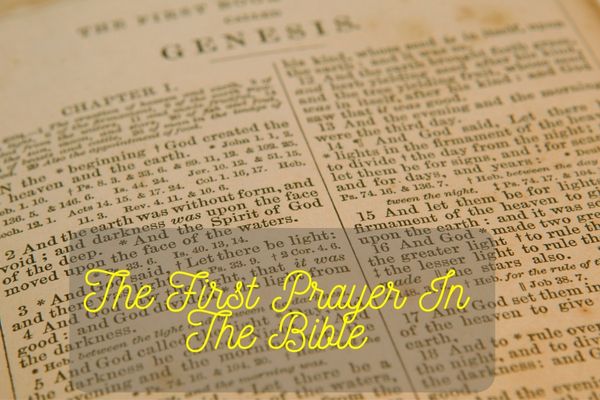The first prayer in the Bible can be found in the book of Genesis, specifically in Genesis 4:26. It states, “At that time people began to call upon the name of the Lord.” This verse is situated within the narrative of the early generations of humanity, following the accounts of Adam and Eve, Cain and Abel, and the subsequent spread of human civilization.
The First Prayer In The Bible
Prayer, the act of communicating with a higher power, has been an integral part of human spirituality throughout history. In the Bible, prayer plays a central role in the relationship between God and humanity. This article aims to delve into the origins and significance of the first prayer recorded in the Bible, offering insights into its context, content, and implications for the development of prayer as a spiritual practice.
Understanding the Significance
The Emergence of Prayer: The verse in Genesis 4:26 marks a significant turning point in human history. It highlights the beginning of prayer as a formal and deliberate act of worship. Prior to this, the Bible does not explicitly mention people engaging in prayer, suggesting that the act of calling upon the name of the Lord was a new and transformative development in human spirituality.
Relationship with God: The first prayer in the Bible signifies the establishment of a personal and intimate relationship between humanity and God. It reflects humanity’s desire to seek God’s presence, guidance, and blessing. By calling upon the name of the Lord, individuals expressed their dependence on and reverence for the divine.
A Response to Sin and Separation: The first prayer emerges in the aftermath of Adam and Eve’s disobedience in the Garden of Eden and the subsequent expulsion from paradise. It can be seen as a response to the brokenness and separation caused by sin. Prayer became a means for humanity to seek reconciliation and restoration with God, acknowledging their need for divine intervention and mercy.
The Power of Invocation: The act of calling upon the name of the Lord carries deep spiritual significance. It represents an invocation, a deliberate and heartfelt appeal to God for help, guidance, and communion. This first prayer sets the precedence for future generations to approach God with sincerity, humility, and trust.
Implications for the Development of Prayer
Continuity and Evolution: The first recorded prayer in the Bible provides a foundation for the development of prayer throughout biblical history. It establishes a precedent for individuals and communities to engage in this sacred practice, leading to the evolution of various forms and expressions of prayer as recorded in subsequent biblical texts.
Communal Worship: The verse in Genesis 4:26 suggests that prayer was not limited to individual practice but also extended to communal worship. The act of calling upon the name of the Lord implies that people gathered together to worship and seek God’s presence collectively. This communal aspect of prayer laid the groundwork for future expressions of public worship and corporate prayer.
Intercession and Petition: The first prayer also highlights the potential for intercession and petition within the act of prayer. As humans began to call upon the name of the Lord, it opened avenues for seeking divine intervention on behalf of others and presenting personal requests and needs before God.
How Does the First Prayer in the Bible Compare to Prayers in Other Religious Texts
The first prayer in the Bible, found in Genesis 4:26, reflects a particular context and theological framework within the Judeo-Christian tradition. While comparisons can be made between prayers in different religious texts, it’s important to recognize the unique characteristics and beliefs associated with each religious tradition. Here are some general observations:
Abrahamic Religions: The first prayer in the Bible belongs to the Abrahamic tradition, which includes Judaism, Christianity, and Islam. Prayers in these traditions often emphasize a personal relationship with God, seeking guidance, forgiveness, and divine intervention. There is an emphasis on monotheism and a belief in a transcendent, all-powerful God.
Hinduism: Prayers in Hinduism, as depicted in texts such as the Vedas and the Upanishads, vary in form and purpose. They can take the form of hymns, mantras, or devotional songs. Hindu prayers often address specific deities or manifestations of the divine, seeking blessings, protection, and spiritual progress. The concept of interconnectedness and the belief in multiple deities are central to Hindu prayer practices.
Buddhism: Buddhism does not emphasize prayer in the same way as the Abrahamic religions. Instead, Buddhist practices focus on meditation, mindfulness, and the cultivation of wisdom and compassion. While there are devotional elements within certain branches of Buddhism, the emphasis is often on personal transformation and liberation from suffering rather than petitionary prayer.
Islam: Islamic prayers, known as Salah or Salat, are an essential aspect of Muslim worship. They involve physical movements, recitation of specific verses from the Quran, and prostration. Islamic prayers are performed at specific times of the day and are considered a means of connecting with Allah, seeking guidance, and expressing gratitude. Islamic prayers emphasize submission to the will of Allah and the belief in the oneness of God.
Conclusion
The first recorded prayer in the Bible, found in Genesis 4:26, signifies a significant milestone in human spirituality. It marks the emergence of prayer as a deliberate act of worship, reflecting humanity’s desire for a relationship with God, seeking reconciliation, and acknowledging dependence on the divine. This first prayer sets the stage for the development of prayer as a central practice within biblical and spiritual traditions. It highlights the power of invocation, the communal nature of worship, and the potential for intercession and petition.
As such, the first prayer serves as a foundational moment in the ongoing dialogue between God and humanity, shaping the course of prayer as a vital aspect of faith and spiritual connection throughout history.
Frequently Asked Questions
1. What is the first prayer recorded in the Bible?
- The first prayer recorded in the Bible is found in Genesis 4:26, where it states, “At that time people began to call upon the name of the Lord.”
2. Who offered the first prayer in the Bible?
- The first prayer in the Bible is not attributed to a specific individual. It signifies the beginning of prayer as a formal and deliberate act of worship by people in general, rather than the prayer of a particular person.
3. What is the significance of the first prayer in the Bible?
- The first prayer in the Bible marks a turning point in human history, as it represents the emergence of prayer as a deliberate act of worship. It signifies humanity’s desire to seek God’s presence, guidance, and blessing and highlights the establishment of a personal and intimate relationship between humanity and God.






